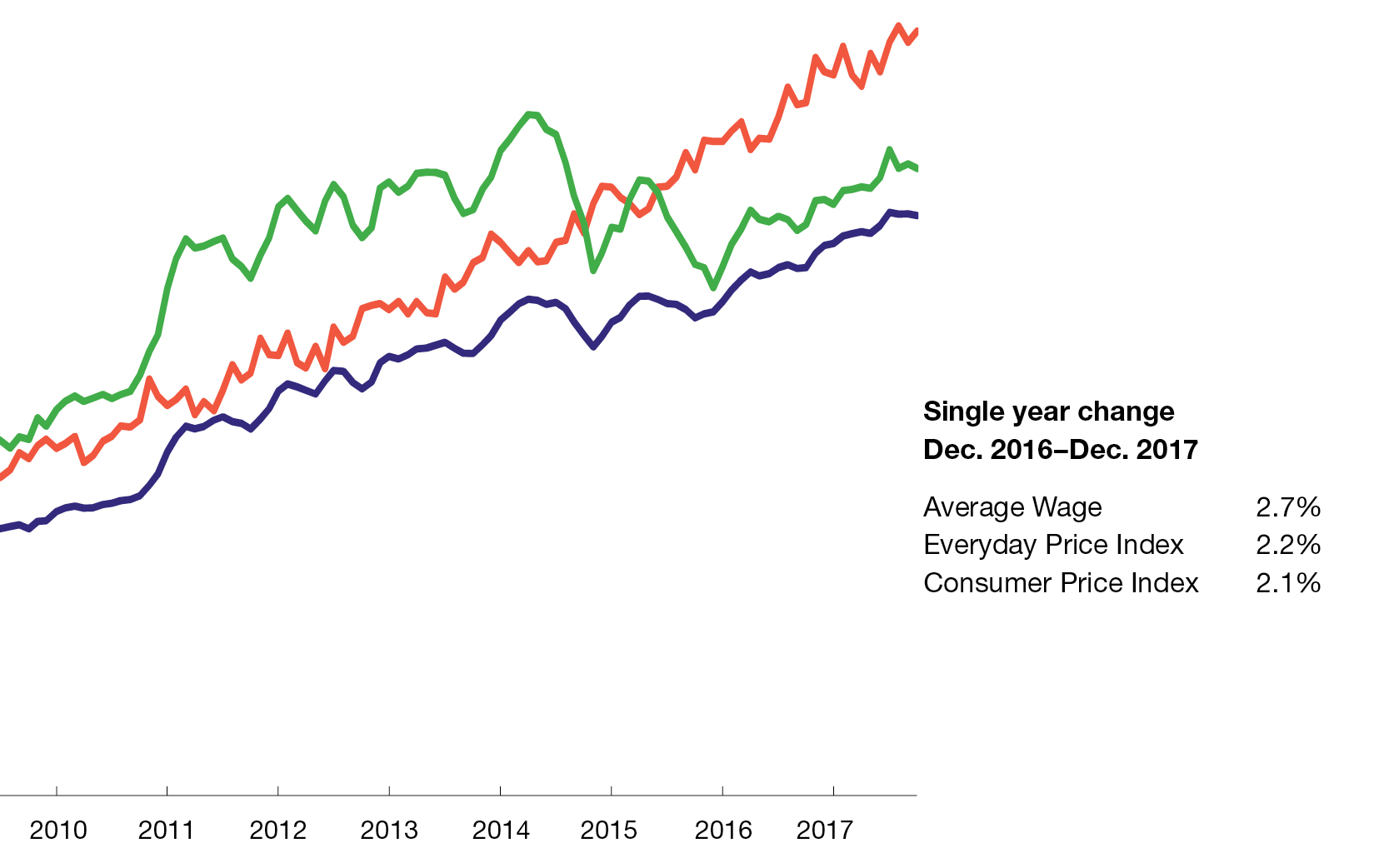Small Businesses Leverage Their Size
This brief takes a different view, showing that the most successful small businesses prosper because of rather than in spite of their size. These businesses often combine niche product offerings, superior customer service, a detailed understanding of local markets, and other attributes that larger firms are less able to capitalize on. After looking at some of the basic economics behind the advantages of smaller firms, this brief reports the results of in-depth interviews with small business owners and managers in New England, Philadelphia, and New York City and provides many examples that other small businesses can use when facing larger competition.
How small businesses prosper
At its core, a firm must gather information about its customers and market and make decisions based on that knowledge. Much of this information can only be gathered by employees “on the ground,” those directly interacting with customers and providing the products or services offered by the firm. The employee at the returns desk of a big-box retailer, for example, will learn the needs and wants of individual customers in far more depth than the CEO of the firm. As businesses grow larger, decision making becomes further removed from those who are most familiar with these details. This is not a mistake that larger firms make but rather a structure necessary to gain cost savings from economies of scale. If a big-box retailer gave every local manager full control over which products to stock, it would lose the bulk discounts from suppliers that are necessary to charge low prices. Similarly, if each individual store in a chain was in charge of its own marketing, the chain as a whole could not maintain a coherent brand identity. To achieve scale, centralized decision makers must take the information from those on the ground and respond for the firm as a whole. But in doing so, some of the detail is lost. Scale is a trade-off, not just a reward for being large.
The most successful small businesses focus on products, services, strategies, and relationships that they can provide because the firms’ decision makers are closer to customers. Economists have long understood the benefits of decentralized decision making. In a classic 1945 paper, Friedrich Hayek argued that a fatal flaw of centrally planned economies was that a central decision maker could not possibly take in and respond to the complex and dispersed information of an economy as well as the sum total of millions of individuals on the ground.
Though Hayek was writing about economic policy, his insights also show a path to competitive success for small businesses:
Practically every individual has some advantage over all others in that he possesses unique information of which beneficial use might be made, but of which use can be made only if the decisions depending on it are left to him or are made with his active cooperation. We need to remember only how much we have to learn in any occupation after we have completed our theoretical training, how big a part of our working life we spend learning particular jobs, and how valuable an asset in all walks of life is knowledge of people, of local conditions, and special circumstances. (“The Use of Knowledge in Society,” American Economic Review, Sept. 1945.)
The owners and managers who make decisions in a small business are usually more intimately involved with customers and the day-to-day running of the firm than decision makers in larger companies. They can stock niche products they know are popular in their local market, individually respond to specific customers’ needs, and react quickly to local events or new information. These strategies are sometimes not worth a larger business’s time or resources but are often enough to allow smaller firms to thrive.
To better understand these successful strategies, I interviewed owners or managers of 14 small businesses that have succeeded in the face of competition from larger firms (Table 1). They include retail, professional services, and manufacturing firms. Across these diverse industries, many similarities emerged when I asked about the advantages of being small. Chart 1 shows the most common responses. All 14 interviewees pointed to higher quality, a different product variety, or providing more niche-oriented products than their larger competitors. Twelve of 14 discussed customer service, including closer relationships with customers and the ability to cater directly to their specific needs. Nine interviewees cited a more intimate and detailed understanding of local or niche markets, and nine also discussed the flexibility to make decisions without red tape. Several interviewees also cited better relationships with employees and the freedom to innovate.
In the remainder of this brief, we’ll dive into their stories and show how the things they do best stem directly from their small size.
Product quality and market niches
To achieve economies of scale, large retail firms must centralize decision making on their product offerings, stocking the same or similar items across many store locations. In doing so, large firms leave open two ways small businesses, through their selection of products, can provide value to the market. First, small businesses can tailor product offerings directly to their own customers or local markets. Second, small businesses can fill market niches that, while not worth the resources of larger competitors, can profitably sustain a smaller operation.
Jackson & Connor, a menswear boutique in Northampton, Mass., distinguishes itself from the competition by the quality and selection of the clothing on its shelves. Owner Will Brideau personally selects the clothing and accessories, working mainly with designers who sell exclusively through small retailers or online. This ensures that customers will find items unavailable in chain stores, but it also allows him to directly apply what he learns from his customers every day in the store to the products he offers. Brideau suggests that such an approach might not fit the business model of large menswear chains with whom he competes, where those making product decisions by necessity spend more time in corporate offices than retail locations.
Mad Macs, a Pittsfield, Mass., computer retailer, uses small size to its advantage by focusing on product quality. If a product is returned by more than two customers who have complaints about quality or reliability, the store stops carrying it. Similar to Jackson & Connor, customer feedback drives product offerings directly, without corporate red tape.
Whole Life Pet Products, also of Pittsfield, Mass., is a small manufacturer of pet food that succeeds in filling a lucrative market niche: all-natural pet products. While larger pet food manufacturers dabble in organic product offerings, consumers who demand these products are well informed and respond to Whole Life’s rigorous approach to quality, safety, and sourcing. Owner John Gigliotti, specifically focusing on the issues relevant to these consumers, can apply this information directly to decisions on the manufacturing process—something larger competitors are unable to do.
From customer service to relationships
We often assume that smart, personable employees will ensure quality customer service. While this is certainly helpful, incentives arising from a company’s business model can also make or break the quality of customer service. Furthermore, small firms necessarily have a less rigid division of labor. While this can raise a small business’s costs, it also may facilitate a more rapid and thorough transfer of information about customers among employees or parts of the company. Small businesses frequently can provide customer service that is more attentive, responsive, and relationship-driven than their larger rivals.
Small businesses often have more freedom to focus on the quality of customer relationships rather than the quantity of sales. The president and CEO of a financial advisory service in Albany, N.Y., considers client service to be his firm’s number-one selling point. The company competes with larger banks and financial firms for clients, and the larger firms often try to sell themselves on the basis of customer service. However, the CEO says that in these large firms, managers and shareholders must rely on generalized metrics to monitor the performance of financial advisers. As long as clients do not leave and revenue streams are maintained, advisers are judged to be doing their job. This method of tracking performance serves as a disincentive to allocating time and effort to customer service beyond a threshold level. Smaller firms can focus instead on enriching relationships, attracting investors who value increased attention and potentially enhancing profits in the long run. A less rigid division of labor means the firm’s executives can understand in a detailed way the development of these relationships.
This focus on the quality over the quantity of customer relationships has parallels in many industries. For example, Little’s Pharmacy in North Adams, Mass., sets itself apart from competitors by offering free home delivery. This service could presumably be offered by large drugstore chains at a relatively low cost. But doing so would interfere with a national chain’s business model, which is based on large numbers of customers purchasing the food, toiletries, and other items offered in the store.
A small business’s freedom to form relationships with customers not only results in repeat purchases but also allows the business to learn important information about its market. We spoke to the former owner of a small energy consulting firm in Philadelphia, Pa., that was eventually bought out by a much larger company. While still independent, the small firm had regular client events such as golf outings, which the former owner said was an important way to learn about what clients needed (exactly the type of on-the-ground data gathering discussed earlier). But the firm’s new corporate owners simply saw the outings as an unnecessary cost and eliminated this valuable way to gather customer data. In the former owner’s opinion, any additional knowledge provided by the new buyer, who had not previously operated in the firm’s line of business, was not worth the detailed knowledge lost by eliminating this form of direct interaction with customers.
Fast and nimble
Running an operation that reaps the benefits of scale requires some uniformity in processes among its employees and business locations. The benefits of such uniformity to a large company are significant. But this provides competitive opportunities for more flexible small businesses that can make and implement decisions more quickly or in a manner more tailored to their own market or operations.
Many small businesses are nimbler than large firms, able to make faster decisions without approval from multiple layers of management and put those decisions into action. Carr Hardware, a small retail chain with six locations in western New England, uses small size to its advantage by quickly responding to the needs of its community. Owner Bart Raiser cites the ability to respond to local weather events, such as blizzards or thunderstorms, as a competitive advantage. Big-box chains have a larger organization to navigate if they want to stock up on ice melt or plywood sheets.
Small businesses are also able to respond more rapidly to customer needs and requests. J.C. Woodward, Project Steward at Benson Woodworking, Walpole, N.H., talked about how the different parts of his business work together efficiently. If a piece is too large to ship in a regular truck, the employee in charge of shipping can simply ask the carpenter, also on site, to refit or cut it. Larger competitors, seeking economies of scale, would necessarily separate building and shipping into their own separate and extensive operations. However, slower communication would result in delays to the customer.
Small businesses can also flexibly tailor equipment and procedures to their own needs. When the energy consultancy mentioned earlier was bought by a larger firm, it required its employees to switch from a computing system the company had long used to another brand that the large firm had an exclusive, discounted contract with. This resulted in both a nuisance in switching systems and ultimately a system that did not match the consultancy’s needs as well. Of course, the change was necessary for the large organization to run at an efficient scale, but it was a burden on the smaller unit.
Understanding local markets
Hayek, quoted earlier, talked about the importance of “knowledge of people, of local conditions, and special circumstances.” Decision makers in small businesses have far more unfiltered access to that information, which they can use in decisions on product selection, marketing, and other strategy. This knowledge frequently comes about through close attention and relationships with customers.
At Little’s Pharmacy, owner David Woods heard feedback from local nurses that older patients were having trouble managing and keeping track of their medications. Little’s quickly replaced childproof bottles with unit-dose blister packaging with clear labels, making it easy to follow what patients had taken on a given day. This anecdote captures several of the advantages of small businesses that we’ve discussed. Good customer service allowed Little’s to gain information that it acted on quickly to overhaul a product and make it better suit the needs of many customers.
Direct information from customers also informs Jackson & Connor’s selection of menswear. Owner Will Brideau can keep abreast of fashion trends in general, but he says that’s no substitute for feedback from directly helping customers. Such information would be several degrees removed from the buyers for a large chain.
The advantages of being small
While large firms must often take a bird’s-eye-view approach to business decisions, those running small businesses can make decisions much closer to ground level. Because of this, they can more directly tailor products, customer service, and other strategic decisions to their area of the market. The key is not to compete with large firms on their own terms but instead to think about the openings in the market where large firms cannot fit. Small businesses certainly face major challenges in any modern economy but can prosper by focusing on what they alone offer.
Small-Businesses-Leverage-Their-Size





